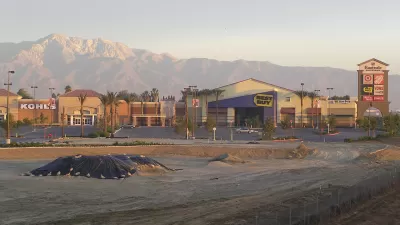One of the largest, most influential regional governments in the state has asked for exemptions from changes to the California Environmental Quality Act (CEQA) that will measure Vehicle Miles Travelled (VMT) instead of Level of Service (LOS).
"[The Southern California Association of Government] sent a last-minute letter attempting to delay progressive updates to California’s outdated environmental standards," according to an article by Melanie Curry, who explains in more detail.
In the letter [PDF], Southern California Association of Governments (SCAG)—the regional transportation planning organization for much of southern California—requested exemptions for highway expansion projects and freight corridors from proposed state rules that could show their true environmental impact in a way that old rules do not.
In effect, SCAG is asking the Governor's Office of Planning and Research, which is developing the reformed CEQA requirements, to "limit the new VMT measure to projects that are close to transit, and also to 'grandfather in' highway expansion and freight corridor projects that have already been approved in planning documents." According to an environmentalist source cited in the article, it looks like SCAG is asking for exemptions on projects that won't perform will under the new environmental review process in the state. According to a SCAG source, the letter was meant to "request that OPR focus first on transit priority areas and allow a longer opt-in period for other areas."
The feet dragging by SCAG stands in contrast to the leadership shown by Pasadena and San Francisco, in beginning to implement CEQA reforms while the state is still hammering out the new details of the law.
FULL STORY: SoCal Government Coalition Wants to Keep Planning for Cars

Study: Maui’s Plan to Convert Vacation Rentals to Long-Term Housing Could Cause Nearly $1 Billion Economic Loss
The plan would reduce visitor accommodation by 25,% resulting in 1,900 jobs lost.

North Texas Transit Leaders Tout Benefits of TOD for Growing Region
At a summit focused on transit-oriented development, policymakers discussed how North Texas’ expanded light rail system can serve as a tool for economic growth.

Why Should We Subsidize Public Transportation?
Many public transit agencies face financial stress due to rising costs, declining fare revenue, and declining subsidies. Transit advocates must provide a strong business case for increasing public transit funding.

How to Make US Trains Faster
Changes to boarding platforms and a switch to electric trains could improve U.S. passenger rail service without the added cost of high-speed rail.

Columbia’s Revitalized ‘Loop’ Is a Hub for Local Entrepreneurs
A focus on small businesses is helping a commercial corridor in Columbia, Missouri thrive.

Invasive Insect Threatens Minnesota’s Ash Forests
The Emerald Ash Borer is a rapidly spreading invasive pest threatening Minnesota’s ash trees, and homeowners are encouraged to plant diverse replacement species, avoid moving ash firewood, and monitor for signs of infestation.
Urban Design for Planners 1: Software Tools
This six-course series explores essential urban design concepts using open source software and equips planners with the tools they need to participate fully in the urban design process.
Planning for Universal Design
Learn the tools for implementing Universal Design in planning regulations.
City of Santa Clarita
Ascent Environmental
Institute for Housing and Urban Development Studies (IHS)
City of Grandview
Harvard GSD Executive Education
Toledo-Lucas County Plan Commissions
Salt Lake City
NYU Wagner Graduate School of Public Service



























